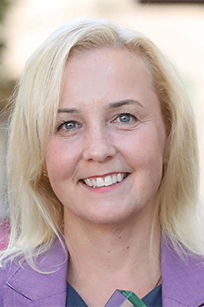Professional development: reaching higher

Around five years’ ago the NHS finance function in Wales faced a number of challenges – low morale; few suitably qualified internal candidates for vacant finance director posts; and criticism of NHS organisations’ financial performance and governance. So finance directors resolved to take action. They set up the NHS Wales Finance Academy to address the issues, and are already seeing early successes.
Under the umbrella term ‘Finance adding value’, the award-winning academy has four programmes – Developing our people; Innovating and adding value; Working in partnership; and Driving excellence. Each is sponsored by a finance director and championed by local lead staff.
Academy director Rebecca Richards (pictured) insists it is very much a solution tailored to the needs of the finance function in Wales and its 760 staff. ‘We aim to create a finance function that is best suited to Wales but comparable to the best anywhere,’ she says, and highlights the reasons why Wales finance directors set up the academy:
- Difficulty recruiting to finance director roles from staff working in NHS Wales and no obvious pipeline of staff coming through to lead
- An ageing workforce in finance with no obvious approach to succession planning for critical roles
- Little circulation of skills and experience and no purposeful approach to encourage the spread of good practice
- Poor organisational financial performance and a need to demonstrate finance skills and capability
- A strong feeling among staff that the professional profile of the finance function was getting lost and devalued
- Poor external governance reviews that identified areas of improvement needed across multiple organisations
- Little standardisation and efficiency in operations, despite the ‘Once for Wales’ approach to procuring national financial systems
- Staff feeling undervalued and unsupported to develop.

‘Part of the Finance Academy’s role is about educating finance staff about value-based healthcare and providing the space to try the approach out for themselves. We also encourage staff to share approaches that work through our innovation compendium, so we can spread great practice across the country,’ Mrs Richards says.
The Working in partnership element of the academy’s work focuses on feedback from NHS finance staff, which it then acts on. ‘This is about the finance community developing itself and bringing itself forward because it wants to. It’s not about what the finance directors or programme team want to do – finance staff are driving the programme.’
Partnership also touches the wider theme of adding value, through closer working with clinicians and other partners.
There are currently 12 clinical and finance partnerships, made up of a clinical director and senior finance business partner with wraparound support from the academy. Each partnership, which started in February, was nominated by its finance and medical directors, and aims to learn more about the local improvement opportunities offered by applying a value-based healthcare lens.
‘Clinical and finance partnerships are really important to the programme and we are looking to do more clinical-finance development,’ says Mrs Richards.
The academy team is examining ways to bring together junior doctors and finance students to forge partnerships at the start of their careers. It has also built strong links with local universities and Rolls Royce. The company approached the NHS body when it was looking to set up its own finance academy. This relationship has, in turn, opened doors to other multinational companies, such as pharmaceutical giant GSK, BAE Systems and Sky. The academy meets with these organisations with the aim of continuously improving its work programme.
The Driving excellence theme focuses on standardising systems and processes. Two processes stand out, Mrs Richards says – procurement to pay and hire to retire. ‘We are trying to standardise end-to-end processes as much as we can, and introduced our “No purchase order, no pay” scheme last year,’ she says. ‘As for hire to retire, we are developing many benefits for staff, including a common electronic staff record and easier access.’
Driving excellence has also focused on financial governance. ‘We have designed an interactive user guide on how to improve financial reports,’ says Mrs Richards. ‘We can’t be prescriptive to boards on financial reports and tell them what they should look like in huge detail. But, nonetheless, we can share best practice and good hints and tips.
‘We are also looking at financial forecasting, looking around the health service and further afield with our industry partners, with a view to launching an interactive guide in the autumn.’
The Developing people theme is about supporting individuals in their career development. It has five talent pipelines, providing leadership development for different groups, from finance trainees to existing finance directors, recognising that development does not stop once this level is reached. One pipeline involves an aspiring director programme and two professionals on it have recently become finance directors in Wales. ‘Those in these programmes have said it creates a strong network of people from organisations across Wales in similar positions, having shared experiences and problems they can solve and share for the common benefit,’ says Mrs Richards.
All five pipelines are now up and running and those that are coming to an end will be re-run in the autumn, subject to demand. A mentoring platform has also been established, with mentors drawn from across the function. ‘It doesn’t matter where you are in your career – if you have some experience, you have something to offer,’ emphasises Mrs Richards.
The NHS Wales finance function had to step up its training. ‘In the past, we would have requests for training in areas such as Excel – which is important but will not necessarily close the skills gap that we have identified,’ Mrs Richards says.
The academy is now working to create a personal development needs tool within the electronic staff record, which will enable self-assessment for current and future roles and provide the intelligence to develop a national training strategy for finance staff.
As well as continuing its current work programme, the academy’s forward programme will also include developing a digital strategy for the finance function and a suite of financial governance improvement guides, as it seeks to add value to the service’s finance staff offer.
A hand up
 Emma Doolan (pictured) has put in place a training and development programme for band 3 to 6 finance staff at Swansea Bay University Health Board, which is being rolled out across Wales.
Emma Doolan (pictured) has put in place a training and development programme for band 3 to 6 finance staff at Swansea Bay University Health Board, which is being rolled out across Wales.
Mrs Doolan, a finance academy people lead and principal finance manager at the health board, says: ‘We wanted a programme that would provide our junior staff with an opportunity to develop their management and leadership style and recognise team dynamics. We were really keen to put softer skills into the programme to inspire our people to deliver their best work, manage their teams successfully and increase productivity.’
Following an initial engagement with the health board’s staff in these bands, the Swansea Bay team put together a five-day programme, run over a five-month period. The training was delivered to 24 people, split into two groups. The programme covers (in order): managing self and others; team dynamics; managing projects and service improvement; presenting and influencing; and time management and effective meetings.
Mrs Doolan says one of the benefits of the programme is that staff gained an understanding of the work their colleagues produced in other parts of the finance department. ‘Some people were producing work on a monthly basis but didn’t fully understand how other areas used that work. Strong bonds were formed between each of the cohorts and this led to helpful discussions. As a result, our people have identified opportunities to streamline processes and we are seeing greater movement of staff between departments.’
Working together
The HFMA Wales Branch is working with the Finance Academy to support the training and development of local finance staff.
Tim Kelland, a Finance Academy people lead and innovation champion, who is also deputy chair of the HFMA Wales Branch, says: ‘The HFMA branch alone could not meet the succession challenges and development needs that the finance profession in Wales is going to experience in the medium to long term. We were doing continuing professional development and staff development events, but it needed something more. Until recently, finance staff development was viewed as a luxury and not a necessity. But everyone in the Welsh NHS finance family now understands the importance of continuous professional development for all its staff including our non-qualified staff,’ he says.
‘The academy has the resources to work closely with representatives of the local finance departments to take a systematic approach to identifying the development needs of all staff – that helps us as a branch when planning our own events and development programme.
‘The Finance Academy is only too pleased to share with us the development needs they have identified, which they may not be in a position to deliver. This is where, as a branch, we are able to step in.
‘We are planning to do more personalised CPD and development events, as well as social networking. We are looking to support members interested in undertaking finance research projects. This has allowed us to ensure our programme is more relevant to our members – there’s huge value in that.’Related content
We are excited to bring you a fun packed Eastern Branch Conference in 2025 over three days.
This event is for those that will benefit from an overview of costing in the NHS or those new to costing and will cover why we cost and the processes.